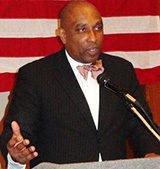
Ellis Washington
The triumph of Ayn Rand and the Fountainhead
By Ellis Washington
Don't set out to raze all shrines – you'll frighten men. Enshrine mediocrity – and the shrines are razed.
~ Ellsworth Toohey
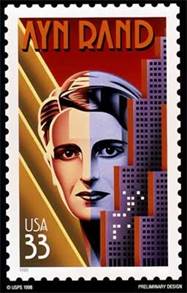 If physical slavery is repulsive, how much more repulsive is the concept of servility of the spirit?
If physical slavery is repulsive, how much more repulsive is the concept of servility of the spirit?
~ Howard Roark
Prologue to a Conservative Utopia
The Fountainhead is a 1949 American film based on Ayn Rand's best-selling 1943 book by the same title. The film, for which Rand wrote the movie adaption and novel, is both a romantic drama and a philosophical work based on her Objectivist philosophy – a character study of the life of Howard Roark, a young architect driven by his radical conservative worldview stressing individualism and self-interest as the highest ideal. For most of his professional life, Roark has paid a severe price protecting his modernist architecture worldview, and thus embraces the Spartan life of struggle in obscurity. Roark is Rand's incarnation of the human will, and his struggle is the existential struggle between Individualism and Collectivism, or in today's politics, a Conservative worldview vs. a Communist-Progressive worldview. Roark is a modernist and believes modern architecture to be superior to then popular neo-Classical schools favored by the current architectural establishment and their corporate financiers.
The film stars Gary Cooper as Roark, Patricia Neal as Dominique Francon, Raymond Massey as Gail Wynand, Robert Douglas as Ellsworth Toohey and Kent Smith as Peter Keating. To avoid being typecast, Rand downplays the more overt political meanings of the novel's narrative, yet emphasizes the virtue and triumph of individualism over Socialist consensus particularly in the complex relationships between Roark and Dominique where Rand exquisitely exposes the virtue or duplicity of the many people who either help or hinder his development as a revolutionary architect of buildings... and Society.
Plot Synopsis
Howard Roark (Gary Cooper) is an individualistic architect who considers convention, conformity and vulgar mediocrity as slavish relics of a long-dead past and thus dares to tread where no man has yet charted to launch his innovative artistic path. "But you see," said Roark quietly, "I have, let's say, sixty years to live. Most of that time will be spent working. I've chosen the work I want to do. If I find no joy in it, then I'm only condemning myself to sixty years of torture. And I can find the joy only if I do my work in the best way possible to me. But the best is a matter of standards – and I set my own standards. I inherit nothing. I stand at the end of no tradition. I may, perhaps, stand at the beginning of one."
Roark's antagonist, Ellsworth Toohey (Robert Douglas), is an utterly amoral and skeptical man and architecture critic for The Banner newspaper. Rand modelled him after the famous British Socialist intellectual, Harold Laski. As a Socialist, he both fears and hates Roark's individualism and thus is compelled to use his newspaper to marginalize him at every opportunity. One character, Henry Cameron (channeling Toohey) tells Roark that "he will suffer greatly because in spite of designing the most beautiful buildings, they will remain on paper and never be erected while he will watch mediocre others reap high commissions and glory because they are willing to copy the past." The affluent and powerful publisher, Gail Wynand (Raymond Massey), is apathetic to Roark's plight, and supports Toohey's anti-modernity crusade aimed at Roark. Wynand's Socialist Will to Power worldview suggests the great German philosopher Friedrich Nietzsche (1844-1900), whom Ayn Rand admired, and is encapsulated in this declaration: "Artistic value is achieved collectively by each man subordinating himself to the standards of the majority."
Dominique Francon (Patricia Neal), a stylish socialite who writes a Banner column admires Roark's work and opposes the newspaper's campaign against him. She is engaged to be married to an architect herself, the unimaginative Peter Keating (Kent Smith). She has never met or seen Roark, but she believes that he is doomed in a world that abhors individualism. Later in the movie she warns Roark about Toohey, her vengeful Banner colleague: "You can't fight him on his terms. You're only a tank – and that's a very clean, innocent weapon. An honest weapon that goes first, out in front, and mows everything down or takes every counterblow. He's a corrosive gas. The kind that eats lungs out." Throughout the book and movie Francon's worldview echoes author Ayn Rand's Objectivist philosophy – "Freedom (n.): To ask nothing. To expect nothing. To depend on nothing."
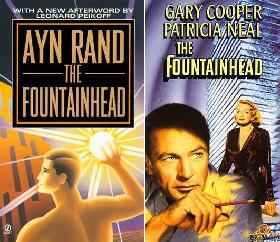
Wynand adores Francon and pressures her to marry him and exposes her fiancé Keating as a materialist man obsessed with possessing and conquering things... including Francon. Architect Roark is bankrupt and is forced to work as a common laborer. He is frustrated at his inability to yet find a client disposed to construct according to his individualist artistic vision and rejects many lucrative opportunities that insist he compromise his modernist principles and design in the neo-Classical style.
On a whim while vacationing at their summer home Francon meets Roark at the nearby quarry which belongs to her father. They are immediately attracted to each other (initially not as lovers, but intellectual Gladiators); Francon wants to help Roark get better work and contrives work for him by purposely breaking her fireplace. After one of their meetings Roark retreats to his small room and discovers a letter offering him a new project, but not in architecture since at this point she has no idea that he is Howard Roark, the brilliant architect. Enraged at her pity towards him, he abruptly quits his job and departs. Francon is angry and frustrated the next day as she goes to the quarry and hears that he quit.
Newspaper mogul, Gail Wynand desperately wants to marry Francon, but since she isn't in love with him she delays her reply due to her psychological conflict she has being in love with the mysterious man at the rock quarry. Finally at a gala party celebrating the new building that Roark has designed she discovers Roark's real identity. Her love for him is further complicated because her newspaper The Banner has campaigned against Roark's modernist style. To reconcile her feelings for him and save his humanity, Francon visits Roark's apartment and proposes to marry him if he forsakes architecture. She employs this unconventional tactic to help her lover avoid a wretched life of fruitless struggles against powers much stronger than he (e.g., Wynand, Ellsworth Toohey, venture capitalists). Affronted, Roark rejects her fears as irrational delusions and insists that they should spend some years separated until she repents from her despairing worldview.
Reeling from Roark's rejection of her Francon finally accepts Wynand's earlier marriage proposal, nevertheless, it is a Pyrrhic victory for Wynand who has no allusions that she will ever truly love him. Keating comes back into the picture and collaborates with Roark to build a colossal housing development. Roark will secretly design the project while allowing Keating to receive all the recognition if Keating promises to construct it precisely as designed. However, Keating deceives Roark and departs from Roark's original design. Enraged that his individualist integrity has been compromised, Roark vows revenge and decides to test Francon's devotion to his individualist vision at any cost. Roark and Francon secretly plant a bomb at the project worksite destroying the housing development before completion; Francon is almost killed and Roark is arrested.
Roark is Public Enemy No. 1, yet Wynand now believes in Roark's uncompromising individualism; to champion his principles at all costs and despite Toohey's crusade, orders his newspapers to support him. This tactic causes Toohey to resign, The Banner's circulation to crash precipitously, and the workers go on strike, nevertheless Wynand continues operations with Francon's help. In the end, Wynand betrays Roark in a futile effort to save his collapsing empire. Although his guilt is all but assured, Roark mounts a surprisingly valiant effort and the courtroom is moved by Roark's compelling closing argument regarding the virtue of self-interest and the necessity to never compromise your principles. Roark chronicles the triumphant genius and creators throughout history and the Promethean tortures they all suffered from mediocrities through the Ages – the gatekeepers of a morally degenerate and corrupt society. The jury finds him not guilty. Roark marries Dominique. As his final act Wynand, in a disturbingly emotionless, robotic manner asks Roark to design his ultimate masterpiece, a skyscraper that will give eternal witness to the supremacy of Man. As Roark leaves his office, Wynand commits suicide.
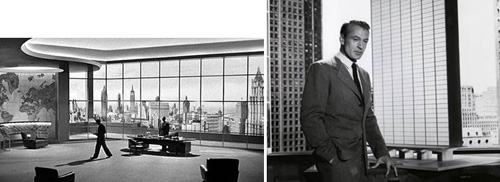
Epilogue to Mao's Barefoot Doctors: Institutionalizing Mediocrities
The Devil takes off his mask in my favorite part of the movie near the conclusion – Ellsworth Toohey's classic monologue, which is a paean to both Hegelian and Marxian dialectical materialism and to Nietzsche's Will to Power and god is dead nihilism. Here are some of the more memorable quotes which today in the Age of Obama have been adopted in Saul Alinsky's Rules for Radicals and the Democrat Socialist Party's Progressive politics of today –
Mao's Barefoot doctor policy perhaps originated as early as 1942 where "he instructed his guerilla government to uproot all shamanic beliefs and superstitions in the Yan'an area and establish model public health villages," wrote Heiner Fruehauf in a fine essay titled, Chinese Medicine in Crisis. "Around the same time, he wrote that 'old doctors, circus entertainers, snake oil salesmen, and street hawkers are all of the same sort,'" he continued. Fruehauf rightly called Mao's Barefoot doctor policy "The Century When Traditional Chinese Medicine Was Tied up in the Straightjacket of Utter Delusion." Ironically major components of this failed Communist healthcare system are being re-implemented in 2015 under Obama's Socialist healthcare system just legalized by SCOTUS.
Although Ayn Rand was an atheist and rejected all organized religion, she was also a moralist and championed an Objectivist normative worldview. A critical student of history and politics, Rand also understood the Socialist-Progressive tactics to deconstruct and destroy America's Judeo-Christian traditions and institutions in the most efficient and expeditious way possible was to strategically place mediocrities and incompetents in charge of every important institution in society and watch the existential chaos, anarchy and nihilism run rampant. Mediocrities ruled in her times in the Age of FDR's New Deal and Welfare State in the 1930s-50s. Mediocrities rule during the liberal fascist Age of Obama of modern times. Thus, the entire worldview of Ayn Rand's classic novel, The Fountainhead can be summarized as a critical choice between two diametrical and incompatible political worldviews:
Howard Roark's Moral Conservatism
"Our country, the noblest country in the history of men, was based on the principle of individualism. The principle of man's inalienable rights. It was a country where a man was free to seek his own happiness, to gain and produce, not to give up and renounce. To prosper, not to starve. To achieve, not to plunder. To hold as his highest possession a sense of his personal value. And as his highest virtue, his self-respect. Look at the results. That is what the collectivists are now asking you to destroy, as much of the earth has been destroyed."
Ellsworth Toohey's Collectivism or Cultural Marxism [Progressivism-Liberalism]
"If you learn how to rule one single man's soul, you can get the rest of mankind. It's the soul... the soul [e.g., mind, will, emotions]. Not whips or swords or fire or guns. That's why the Caesars, the Attilas, the Napoleons were fools and did not last. We will. The soul... is that which can't be ruled. It must be broken. Drive a wedge in, get your fingers on it – and the man is yours."
*N.B.: See article on Ayn Rand, http://www.britannica.com/biography/Ayn-Rand. The Oxford Guide to Philosophy, Ted Honderich [Editor], (Oxford University Press, 2005), pp. 667-68 [Ethical Objectivism, Subjectivism].
Book Notice
Please purchase my latest opus dedicated to that Conservative Colossus, Supreme Court Justice Clarence Thomas. Here are the latest two new volumes from my ongoing historical series – THE PROGRESSIVE REVOLUTION: History of Liberal Fascism through the Ages (University Press of America, 2015):
However, before the book is officially released to the public, I have to place 100 pre-publication orders (50 orders per each volume). I need your help to make this happen ASAP. Please place your order today for Volume 3 & Volume 4. Of course, if you can order all 100 copies today, the book will become official tomorrow.
Please circulate this flyer to all your email contacts & Facebook/Twitter followers who may be interested in purchasing this opus which will serve as a ready apologetic against the rampant Marxist-Progressive propaganda taught in America's public schools, colleges, universities, graduate schools, and law schools. Thanks in advance to all my friends, associates and colleagues for your invaluable support! Law and History Blog: www.EllisWashingtonReport.com
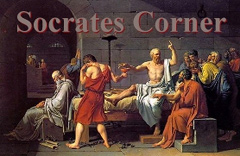 Invitation for manuscripts
Invitation for manuscripts
I am starting a new a program on my blog dedicated to giving young conservatives (ages 14-35) a regular place to display and publish their ideas called Socrates Corner. If you know of any young person who wants to publish their ideas on any subject, have them send their essay manuscripts to my email at ewashington@wnd.com.
© Ellis Washington
July 11, 2015
Don't set out to raze all shrines – you'll frighten men. Enshrine mediocrity – and the shrines are razed.
~ Ellsworth Toohey
 If physical slavery is repulsive, how much more repulsive is the concept of servility of the spirit?
If physical slavery is repulsive, how much more repulsive is the concept of servility of the spirit?~ Howard Roark
Prologue to a Conservative Utopia
The Fountainhead is a 1949 American film based on Ayn Rand's best-selling 1943 book by the same title. The film, for which Rand wrote the movie adaption and novel, is both a romantic drama and a philosophical work based on her Objectivist philosophy – a character study of the life of Howard Roark, a young architect driven by his radical conservative worldview stressing individualism and self-interest as the highest ideal. For most of his professional life, Roark has paid a severe price protecting his modernist architecture worldview, and thus embraces the Spartan life of struggle in obscurity. Roark is Rand's incarnation of the human will, and his struggle is the existential struggle between Individualism and Collectivism, or in today's politics, a Conservative worldview vs. a Communist-Progressive worldview. Roark is a modernist and believes modern architecture to be superior to then popular neo-Classical schools favored by the current architectural establishment and their corporate financiers.
The film stars Gary Cooper as Roark, Patricia Neal as Dominique Francon, Raymond Massey as Gail Wynand, Robert Douglas as Ellsworth Toohey and Kent Smith as Peter Keating. To avoid being typecast, Rand downplays the more overt political meanings of the novel's narrative, yet emphasizes the virtue and triumph of individualism over Socialist consensus particularly in the complex relationships between Roark and Dominique where Rand exquisitely exposes the virtue or duplicity of the many people who either help or hinder his development as a revolutionary architect of buildings... and Society.
Plot Synopsis
Howard Roark (Gary Cooper) is an individualistic architect who considers convention, conformity and vulgar mediocrity as slavish relics of a long-dead past and thus dares to tread where no man has yet charted to launch his innovative artistic path. "But you see," said Roark quietly, "I have, let's say, sixty years to live. Most of that time will be spent working. I've chosen the work I want to do. If I find no joy in it, then I'm only condemning myself to sixty years of torture. And I can find the joy only if I do my work in the best way possible to me. But the best is a matter of standards – and I set my own standards. I inherit nothing. I stand at the end of no tradition. I may, perhaps, stand at the beginning of one."
Roark's antagonist, Ellsworth Toohey (Robert Douglas), is an utterly amoral and skeptical man and architecture critic for The Banner newspaper. Rand modelled him after the famous British Socialist intellectual, Harold Laski. As a Socialist, he both fears and hates Roark's individualism and thus is compelled to use his newspaper to marginalize him at every opportunity. One character, Henry Cameron (channeling Toohey) tells Roark that "he will suffer greatly because in spite of designing the most beautiful buildings, they will remain on paper and never be erected while he will watch mediocre others reap high commissions and glory because they are willing to copy the past." The affluent and powerful publisher, Gail Wynand (Raymond Massey), is apathetic to Roark's plight, and supports Toohey's anti-modernity crusade aimed at Roark. Wynand's Socialist Will to Power worldview suggests the great German philosopher Friedrich Nietzsche (1844-1900), whom Ayn Rand admired, and is encapsulated in this declaration: "Artistic value is achieved collectively by each man subordinating himself to the standards of the majority."
Dominique Francon (Patricia Neal), a stylish socialite who writes a Banner column admires Roark's work and opposes the newspaper's campaign against him. She is engaged to be married to an architect herself, the unimaginative Peter Keating (Kent Smith). She has never met or seen Roark, but she believes that he is doomed in a world that abhors individualism. Later in the movie she warns Roark about Toohey, her vengeful Banner colleague: "You can't fight him on his terms. You're only a tank – and that's a very clean, innocent weapon. An honest weapon that goes first, out in front, and mows everything down or takes every counterblow. He's a corrosive gas. The kind that eats lungs out." Throughout the book and movie Francon's worldview echoes author Ayn Rand's Objectivist philosophy – "Freedom (n.): To ask nothing. To expect nothing. To depend on nothing."

Wynand adores Francon and pressures her to marry him and exposes her fiancé Keating as a materialist man obsessed with possessing and conquering things... including Francon. Architect Roark is bankrupt and is forced to work as a common laborer. He is frustrated at his inability to yet find a client disposed to construct according to his individualist artistic vision and rejects many lucrative opportunities that insist he compromise his modernist principles and design in the neo-Classical style.
On a whim while vacationing at their summer home Francon meets Roark at the nearby quarry which belongs to her father. They are immediately attracted to each other (initially not as lovers, but intellectual Gladiators); Francon wants to help Roark get better work and contrives work for him by purposely breaking her fireplace. After one of their meetings Roark retreats to his small room and discovers a letter offering him a new project, but not in architecture since at this point she has no idea that he is Howard Roark, the brilliant architect. Enraged at her pity towards him, he abruptly quits his job and departs. Francon is angry and frustrated the next day as she goes to the quarry and hears that he quit.
Newspaper mogul, Gail Wynand desperately wants to marry Francon, but since she isn't in love with him she delays her reply due to her psychological conflict she has being in love with the mysterious man at the rock quarry. Finally at a gala party celebrating the new building that Roark has designed she discovers Roark's real identity. Her love for him is further complicated because her newspaper The Banner has campaigned against Roark's modernist style. To reconcile her feelings for him and save his humanity, Francon visits Roark's apartment and proposes to marry him if he forsakes architecture. She employs this unconventional tactic to help her lover avoid a wretched life of fruitless struggles against powers much stronger than he (e.g., Wynand, Ellsworth Toohey, venture capitalists). Affronted, Roark rejects her fears as irrational delusions and insists that they should spend some years separated until she repents from her despairing worldview.
Reeling from Roark's rejection of her Francon finally accepts Wynand's earlier marriage proposal, nevertheless, it is a Pyrrhic victory for Wynand who has no allusions that she will ever truly love him. Keating comes back into the picture and collaborates with Roark to build a colossal housing development. Roark will secretly design the project while allowing Keating to receive all the recognition if Keating promises to construct it precisely as designed. However, Keating deceives Roark and departs from Roark's original design. Enraged that his individualist integrity has been compromised, Roark vows revenge and decides to test Francon's devotion to his individualist vision at any cost. Roark and Francon secretly plant a bomb at the project worksite destroying the housing development before completion; Francon is almost killed and Roark is arrested.
Roark is Public Enemy No. 1, yet Wynand now believes in Roark's uncompromising individualism; to champion his principles at all costs and despite Toohey's crusade, orders his newspapers to support him. This tactic causes Toohey to resign, The Banner's circulation to crash precipitously, and the workers go on strike, nevertheless Wynand continues operations with Francon's help. In the end, Wynand betrays Roark in a futile effort to save his collapsing empire. Although his guilt is all but assured, Roark mounts a surprisingly valiant effort and the courtroom is moved by Roark's compelling closing argument regarding the virtue of self-interest and the necessity to never compromise your principles. Roark chronicles the triumphant genius and creators throughout history and the Promethean tortures they all suffered from mediocrities through the Ages – the gatekeepers of a morally degenerate and corrupt society. The jury finds him not guilty. Roark marries Dominique. As his final act Wynand, in a disturbingly emotionless, robotic manner asks Roark to design his ultimate masterpiece, a skyscraper that will give eternal witness to the supremacy of Man. As Roark leaves his office, Wynand commits suicide.

Epilogue to Mao's Barefoot Doctors: Institutionalizing Mediocrities
The Devil takes off his mask in my favorite part of the movie near the conclusion – Ellsworth Toohey's classic monologue, which is a paean to both Hegelian and Marxian dialectical materialism and to Nietzsche's Will to Power and god is dead nihilism. Here are some of the more memorable quotes which today in the Age of Obama have been adopted in Saul Alinsky's Rules for Radicals and the Democrat Socialist Party's Progressive politics of today –
- Make Man feel small.
- Kill Man's sense of values.
- Kill by laughter.
- Don't allow men to be happy... Make them think that the mere thought of a personal desire is evil.
- Bring them to a state where saying 'I want' is no longer a natural right, but a shameful admission.
- Nature allows no vacuum. Empty man's soul – and the space is yours to fill.
- Don't set out to raze all shrines – you'll frighten men. Enshrine mediocrity – and the shrines are razed.
Mao's Barefoot doctor policy perhaps originated as early as 1942 where "he instructed his guerilla government to uproot all shamanic beliefs and superstitions in the Yan'an area and establish model public health villages," wrote Heiner Fruehauf in a fine essay titled, Chinese Medicine in Crisis. "Around the same time, he wrote that 'old doctors, circus entertainers, snake oil salesmen, and street hawkers are all of the same sort,'" he continued. Fruehauf rightly called Mao's Barefoot doctor policy "The Century When Traditional Chinese Medicine Was Tied up in the Straightjacket of Utter Delusion." Ironically major components of this failed Communist healthcare system are being re-implemented in 2015 under Obama's Socialist healthcare system just legalized by SCOTUS.
Although Ayn Rand was an atheist and rejected all organized religion, she was also a moralist and championed an Objectivist normative worldview. A critical student of history and politics, Rand also understood the Socialist-Progressive tactics to deconstruct and destroy America's Judeo-Christian traditions and institutions in the most efficient and expeditious way possible was to strategically place mediocrities and incompetents in charge of every important institution in society and watch the existential chaos, anarchy and nihilism run rampant. Mediocrities ruled in her times in the Age of FDR's New Deal and Welfare State in the 1930s-50s. Mediocrities rule during the liberal fascist Age of Obama of modern times. Thus, the entire worldview of Ayn Rand's classic novel, The Fountainhead can be summarized as a critical choice between two diametrical and incompatible political worldviews:
Howard Roark's Moral Conservatism
"Our country, the noblest country in the history of men, was based on the principle of individualism. The principle of man's inalienable rights. It was a country where a man was free to seek his own happiness, to gain and produce, not to give up and renounce. To prosper, not to starve. To achieve, not to plunder. To hold as his highest possession a sense of his personal value. And as his highest virtue, his self-respect. Look at the results. That is what the collectivists are now asking you to destroy, as much of the earth has been destroyed."
Ellsworth Toohey's Collectivism or Cultural Marxism [Progressivism-Liberalism]
"If you learn how to rule one single man's soul, you can get the rest of mankind. It's the soul... the soul [e.g., mind, will, emotions]. Not whips or swords or fire or guns. That's why the Caesars, the Attilas, the Napoleons were fools and did not last. We will. The soul... is that which can't be ruled. It must be broken. Drive a wedge in, get your fingers on it – and the man is yours."
*N.B.: See article on Ayn Rand, http://www.britannica.com/biography/Ayn-Rand. The Oxford Guide to Philosophy, Ted Honderich [Editor], (Oxford University Press, 2005), pp. 667-68 [Ethical Objectivism, Subjectivism].
Book Notice
Please purchase my latest opus dedicated to that Conservative Colossus, Supreme Court Justice Clarence Thomas. Here are the latest two new volumes from my ongoing historical series – THE PROGRESSIVE REVOLUTION: History of Liberal Fascism through the Ages (University Press of America, 2015):
However, before the book is officially released to the public, I have to place 100 pre-publication orders (50 orders per each volume). I need your help to make this happen ASAP. Please place your order today for Volume 3 & Volume 4. Of course, if you can order all 100 copies today, the book will become official tomorrow.
Please circulate this flyer to all your email contacts & Facebook/Twitter followers who may be interested in purchasing this opus which will serve as a ready apologetic against the rampant Marxist-Progressive propaganda taught in America's public schools, colleges, universities, graduate schools, and law schools. Thanks in advance to all my friends, associates and colleagues for your invaluable support! Law and History Blog: www.EllisWashingtonReport.com
 Invitation for manuscripts
Invitation for manuscriptsI am starting a new a program on my blog dedicated to giving young conservatives (ages 14-35) a regular place to display and publish their ideas called Socrates Corner. If you know of any young person who wants to publish their ideas on any subject, have them send their essay manuscripts to my email at ewashington@wnd.com.
© Ellis Washington
The views expressed by RenewAmerica columnists are their own and do not necessarily reflect the position of RenewAmerica or its affiliates.
(See RenewAmerica's publishing standards.)




















